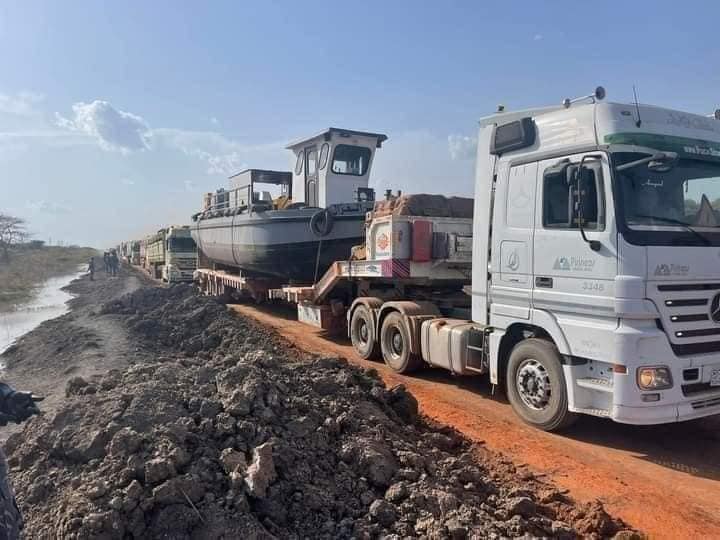
This photo shows some heavy trucks transporting Egyptian dredging machines arriving at Sudan-South Sudan border of Unity state - Courtesy
South Sudan’s dredging deal with the Egyptian government has been challenged before the East Africa Court of Justice by lawyers.
This came weeks after the Unity state government received Egyptian water dredging machines for clearing the Naam River and Bahr El-Ghazal basin.
The project is said to be implemented by the Egyptian government in partnership with the government of South Sudan.
Last week, the South Sudan Water Resources and Irrigation Ministry announced the arrival of a 21-truck convoy from Egypt via Sudan carrying heavy dredging machines, sparking mixed reactions among the citizens.
The move, according to lawyers Elario Adam and Athiangbiar Deng, is environmentally unsustainable and it will traverse protected areas in East Africa.
This, they say, will impact on livelihoods, gender, food, children and public health of the East Africans.
The advocates argued that the East Africa Laws required an environmental impact assessment to be carried out prior the implementation of the project.
Adam, one of the lawyers, cited Article 39 of the Treaty for the Establishment of the East African Community Treaty.
He says they have submitted their petition to the Attorney General of the Republic of South Sudan as partner articles 1 and 3 of the EAC Treaty.
Advocate Adam says the government of South Sudan has been given up to 45 days from the date of submission to respond to the petition.
“The main reason for this application is challenging the legality of the dredging along the Naam River Nile in Unity state and Bahr El-Ghazal basin,” Adam told Eye Radio.
“According to the East Africa laws prior to this kind of project there must be an assessments to be put in place, so we are asking the government if they ever carried out an environmental impact assessment or human rights assessment, and if they ever consulted the public,
“We really do not have an issue with the government projects, but we are questioning the government to avail to us agreement because the government agreement is a public document,
“The public hasn’t gotten an opportunity to go through that agreement which is a violation of our constitutional right for example the access to information,
“We are also appealing to the government to be transparent and to tell us exactly what are the terms in that agreement.”
Over the years, Egypt has used its extensive diplomatic connections and the colonial-era 1929 and 1959 agreements to successfully prevent the construction of any major infrastructure projects on the tributaries of the Nile.
Support Eye Radio, the first independent radio broadcaster of news, information & entertainment in South Sudan.
Make a monthly or a one off contribution.
Copyright 2024. All rights reserved. Eye Radio is a product of Eye Media Limited.